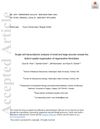 56 citations,
June 2015 in “Nature Protocols”
56 citations,
June 2015 in “Nature Protocols” Two-photon microscopy helps observe hair follicle stem cell behaviors in mice.
 34 citations,
September 2020 in “BMC Endocrine Disorders”
34 citations,
September 2020 in “BMC Endocrine Disorders” Existing drug dexamethasone may lower death risk in severe COVID-19 cases; more research needed for other drugs.
 286 citations,
January 2009 in “Human Reproduction Update”
286 citations,
January 2009 in “Human Reproduction Update” Women with the NIH type of PCOS have more obesity and higher risk of diabetes and heart disease than those with other types of PCOS.
 81 citations,
June 2012 in “European journal of human genetics”
81 citations,
June 2012 in “European journal of human genetics” Inherited ichthyoses cause widespread skin scaling and thickening due to gene mutations.
 March 2024 in “International journal of molecular sciences”
March 2024 in “International journal of molecular sciences” Zinc, copper, and iron are important for skin health and may help diagnose skin diseases.
 September 2024 in “Journal of Inflammation Research”
September 2024 in “Journal of Inflammation Research” Type 1 Diabetes prevents hair growth by causing cell death in hair follicles.
 16 citations,
January 2016 in “Journal of Investigative Dermatology”
16 citations,
January 2016 in “Journal of Investigative Dermatology” Mice without the IL-6 gene had more hair growth after injury due to higher activity of a related protein, Stat3.
5 citations,
January 2021 in “PeerJ” Elephant tail-hair can show past stress levels, matching times when stressful events happened.
 May 2023 in “Animal Reproduction Update”
May 2023 in “Animal Reproduction Update” High levels of cortisol in hair show long-term stress which can lower fertility in animals.
11 citations,
May 2020 in “Frontiers in psychiatry” Child abuse is linked to higher BMI, but not because of hair cortisol or cortisone levels.
21 citations,
March 2018 in “American Journal Of Pathology” Mutations in NIPAL4 cause skin issues by disrupting lipid layers, but some improvement is seen with topical treatment.
 1 citations,
January 2009 in “Elsevier eBooks”
1 citations,
January 2009 in “Elsevier eBooks” Anorexia Nervosa and Bulimia Nervosa are complex eating disorders with increasing incidence among young females, significant morbidity, and varying mortality rates, requiring more research for better treatment.
 25 citations,
April 2021 in “npj Regenerative Medicine”
25 citations,
April 2021 in “npj Regenerative Medicine” Mathematical modeling can improve regenerative medicine by predicting biological processes and optimizing therapy development.
 3 citations,
May 2017 in “Heliyon”
3 citations,
May 2017 in “Heliyon” Wound healing can help prevent hair loss from chemotherapy in young rats by increasing interleukin-1β signaling.
 January 2023 in “Dermatologic Therapy”
January 2023 in “Dermatologic Therapy” A new hand-held light therapy device was found to be safe and effective for treating mild-to-moderate acne.
 January 2025 in “Cosmetics”
January 2025 in “Cosmetics” Exosomes could help treat skin and hair issues by improving healing and reducing stress.
 10 citations,
July 2022 in “Dermatology and Therapy”
10 citations,
July 2022 in “Dermatology and Therapy” Melasma's causes include genetics, sun exposure, hormones, and oxidative stress, and understanding these can help create better treatments.
 1 citations,
November 2015 in “Indian Journal of Clinical Biochemistry”
1 citations,
November 2015 in “Indian Journal of Clinical Biochemistry” The conference presented findings on how vitamin D levels, genetic factors, and lifestyle choices like smoking and yoga affect various health conditions and diseases.
 42 citations,
March 2018 in “PLOS Biology”
42 citations,
March 2018 in “PLOS Biology” Autophagy is important for human hair growth and health.
November 2020 in “IntechOpen eBooks” Not getting enough minerals can lead to health problems and shorter lifespans.
 September 2023 in “Nature Communications”
September 2023 in “Nature Communications” Immune cells are essential for skin regeneration using biomaterial scaffolds.
 10 citations,
January 2019 in “Advances in Clinical and Experimental Medicine”
10 citations,
January 2019 in “Advances in Clinical and Experimental Medicine” Certain variations in the vitamin D receptor gene are linked to an increased risk of polycystic ovary syndrome.
 December 2022 in “Frontiers in Pharmacology”
December 2022 in “Frontiers in Pharmacology” Tianma Gouteng decoction may help prevent hair loss and promote hair growth.
 35 citations,
November 2020 in “Experimental Dermatology”
35 citations,
November 2020 in “Experimental Dermatology” Different types of skin cells are organized in a special way in large wounds to help with healing and hair growth.
 67 citations,
February 2020 in “Journal of Ginseng Research”
67 citations,
February 2020 in “Journal of Ginseng Research” Korean Red Ginseng has beneficial components that help with stress, immunity, fatigue, memory, blood flow, and disease protection.
 41 citations,
June 2018 in “Medicine Health Care and Philosophy”
41 citations,
June 2018 in “Medicine Health Care and Philosophy” The article suggests using four questions to tell apart necessary medicalization from excessive medicalization, focusing on problem significance, social expectations, medical understanding, and effective resolution.
 22 citations,
October 2020 in “Anais Brasileiros de Dermatologia”
22 citations,
October 2020 in “Anais Brasileiros de Dermatologia” The Brazilian Society of Dermatology agrees that oral isotretinoin is effective for acne and other skin conditions, and it's safe when monitored, but more research is needed on dosing and duration.
 November 2023 in “Nature Communications”
November 2023 in “Nature Communications” Cells lacking the Bax protein can outcompete others, leading to better tissue repair and hair growth.
 23 citations,
September 2018 in “Journal of Investigative Dermatology”
23 citations,
September 2018 in “Journal of Investigative Dermatology” A hydrogel made from pig fat helps wounds heal faster by regenerating skin fat cells.
 December 2023 in “Scientific reports”
December 2023 in “Scientific reports” Fermented soy protein may help prevent bone loss by affecting bone cell activity.


























